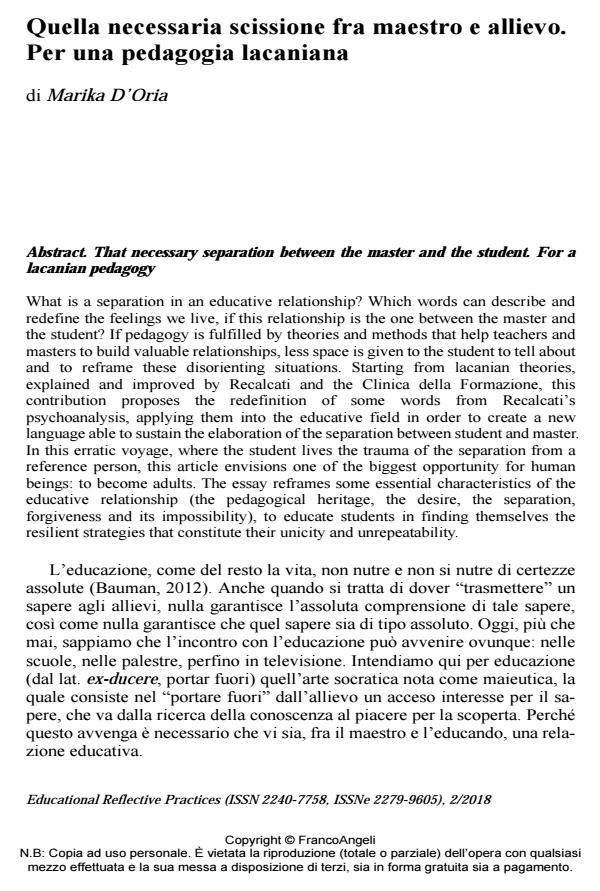Quella necessaria scissione fra maestro e allievo. Per una pedagogia lacaniana
Titolo Rivista EDUCATIONAL REFLECTIVE PRACTICES
Autori/Curatori Marika D’Oria
Anno di pubblicazione 2019 Fascicolo 2018/2
Lingua Italiano Numero pagine 18 P. 125-142 Dimensione file 215 KB
DOI 10.3280/ERP2018-002009
Il DOI è il codice a barre della proprietà intellettuale: per saperne di più
clicca qui
Qui sotto puoi vedere in anteprima la prima pagina di questo articolo.
Se questo articolo ti interessa, lo puoi acquistare (e scaricare in formato pdf) seguendo le facili indicazioni per acquistare il download credit. Acquista Download Credits per scaricare questo Articolo in formato PDF

FrancoAngeli è membro della Publishers International Linking Association, Inc (PILA)associazione indipendente e non profit per facilitare (attraverso i servizi tecnologici implementati da CrossRef.org) l’accesso degli studiosi ai contenuti digitali nelle pubblicazioni professionali e scientifiche
What is a separation in an educative relationship? Which words can describe and redefine the feelings we live, if this relationship is the one between the master and the student? If pedagogy is fulfilled by theories and methods that help teachers and masters to build valuable relationships, less space is given to the student to tell about and to reframe these disorienting situations. Starting from lacanian theories, explained and improved by Recalcati and the Clinica della Formazione, this contribution proposes the redefinition of some words from Recalcati’s psychoanalysis, applying them into the educative field in order to create a new language able to sustain the elaboration of the separation between student and master. In this erratic voyage, where the student lives the trauma of the separation from a reference person, this article envisions one of the biggest opportunity for human beings: to become adults. The essay reframes some essential characteristics of the educative relationship (the pedagogical heritage, the desire, the separation, forgiveness and its impossibility), to educate students in finding themselves the resilient strategies that constitute their unicity and unrepeatability
Marika D’Oria, Quella necessaria scissione fra maestro e allievo. Per una pedagogia lacaniana in "EDUCATIONAL REFLECTIVE PRACTICES" 2/2018, pp 125-142, DOI: 10.3280/ERP2018-002009